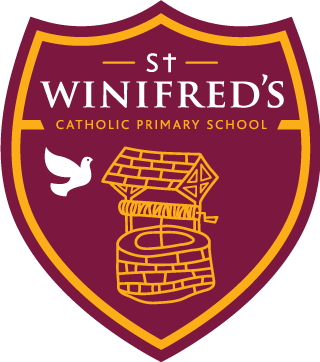EYFS
Statement of Intent
Intent
At St Winifred’s Catholic Primary School, our aim in Early Years and Foundation Stage is to build strong foundations and resilience, so that children can grow to become successful, happy, life-long learners and members of society. We follow the statutory framework for the Early Years Foundation Stage setting the standards for learning, development and care for children from birth to 5 years.
It is important to take into consideration the starting points and needs of our pupils as they begin their learning journey and this is achieved through close liaison with parents and carers and building caring, positive relationships with our children and their families based on mutual respect.
We seek to provide an environment where beliefs and values of the Catholic faith are taught, explored, developed and nurtured and where every child is recognised as a unique individual. Differences within our school community are welcomed and celebrated.
We believe that children learn effectively when they feel safe and happy. A strong emphasis is placed on the three Prime Areas of learning; personal, social and emotional development, communication and language and physical development. These core areas of learning help develop skills, amongst others, in thinking and understanding, co-operation and collaboration, self-confidence and empathy.
By the end of the Reception year, our intent is to ensure that all children have made good progress and are equipped with the skills and knowledge to progress smoothly into Year 1.
Implementation
A new theme is introduced each half term to inspire learning but also allowing flexibility to take account of children’s own interests and ideas. Children engage in a balance of child-initiated play and adult-directed activities with some whole class learning on the carpet.
We provide an engaging environment both inside and outside that allows independence to explore as well as challenge children’s thinking; we believe in the importance of giving children time to explore in order to deepen their learning experiences. The environment and activities also reflect the four specific areas of learning: literacy, mathematics, understanding the world and expressive arts and design and where possible, cross curricular links are encouraged.
Reading is at the heart of our curriculum and we seek to instil ‘a love of books’ in every child. Opportunities to share books are planned into the day to develop vocabulary as well as children’s imagination. Children take part in ‘helicopter stories’ to bring their stories to life as well as gain confidence at performing.
Daily phonics lessons take place using the synthetic phonics programme ‘Little Wandle’. This programme is also continued into KS1. Regular guided reading sessions help develop comprehension, vocabulary and blending skills.
Children are encouraged to read at home and are given reading scheme books as well as books from our book corner to take home and share. Literacy lessons use some schemes of work by The Literacy Curriculum; a particular text is chosen and planned activities over a two or three-week period allow for deeper immersion into texts.
We use the whole school approach and use Maths Mastery (NCETM) as a daily 10 minutes session. This provides children a better understanding of numbers within 10. We provide rich, first hand experiences that aim to widen awe and wonder.
Impact
Our inclusive approach means learning is modelled and scaffolded where necessary and activities are carefully differentiated so that they are accessible to all children. Our curriculum meets the needs of our children, including our disadvantaged pupils and those with SEND, and we spend time looking at and evaluating how children are learning.
Our curriculum and its delivery ensure that children make good progress. We believe our high standards are due to the enriched play-based exploration alongside the rigour of assessment and teaching the children have as they move through the early years – a rich diet of balanced learning experiences is undoubtedly the best way to develop happy, curious children.

 St
Winifred's Primary School
St
Winifred's Primary School

